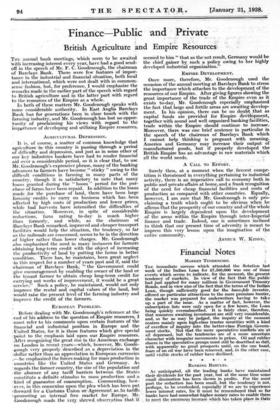Finance—Public and Private
British Agriculture and Empire Resources
THE annual bank meetings, which seem to be awaited with increasing interest every year, have had a good send- Off in the speech of Mr. F. C. Goodenough, the chairman of Barclays Bank. There were few features of impor- tance in the industrial and financial situation, both local and international, which were not dealt with in common- sense fashion, but, for preference, I would emphasize the remarks made in the earlier part of the speech with regard to British agriculture and in the latter part with regard to the resources of the Empire as a whole. In both of these matters Mr. Goodenough speaks with some considerable authority. In East Anglia Barclays Bank has for generations been in close touch with the farming industry, and Mr. Goodenough has lost no oppor- tunity a proclaiming his views with regard to the importance of developing and utilizing Empire resources.
AGRICULTURAL DEPRESSION.
It is, of course, a matter of common knowledge that agriculture in this country is passing through a period of difficulty and depression, and just as in some other of our key industries bankers have had to render financial aid over a considerable period, so it is clear that, to use Mr. Goodenough's expressive phrase, many of the banking advances to fanners have become " sticky" owing to the difficult conditions in farming in many parts of the country, though it is satisfactory to 'note that many loans granted during the " boom " period for the pur- chase of farms have been repaid. In addition to the loans made for the purchase of land, there have been large farming credits to• carry on business which has. been affected by high costs of production and lower prices, ;while bad harvests have intensified the difficulties of the situation. Moreover, in spite of considerable Teductions, -farm rating to-day is. much higher .than formerly, and while, as the chairman of Barclays Bank remarked, improved and cheaper transport facilities would help the situation, the tendency, so far as the railroads are concerned, seems to be in the direction of higher rather than lower charges. Mr. Goodenough also emphasized the need in many instances for farmers *obtaining long-term credit with the object of increasing the productivity of land by putting the farms in better -condition. There has, he maintains, been great neglect in this respect for a number of years past and if, said the :chairman of Barclays • Bank; " the Government could /lye encouragement by enabling the owner of the land or the tenant farmer to obtain cheap long-term credit for -carrying out works of improvement, it would be a great :service." Such a policy, he maintained, would not only -improve the rental and capital values Of the land, but -would raise the present level of the farming industry and • improve the credit of the farmers.
EUROPEAN PROBLEMS.
. Before dealing with Mr. Goodenough's reference at the .end of his address to the question of Empire resources, I -must refer to his comments upon certain features of the financial and industrial position in Europe and the :United States, for it is those features which give special :point to the emphasis laid upon our Empire resources. :After recognizing the great rise in the American exchange - on London in recent years—which, however, Mr. Goode- -nough very properly- described as a depreciation in the :dollar rather than an appreciation in European currencies .—he emphasized the forces making for mass production in -countries like the United States and Germany. As • regards the former country, the size of the population and - the absence of any tariff barriers between _the States constitute a definite stimulus to mass production- and _st :kind of guarantee .of consumption. Commenting, how- - ever, in this connexion upon the plea which has been put t■forwiirct for -a Customs Union or Agreement .as .to _tariffs -.-„promoting an internal free market for Europe, Mr, Goodenough made the very shrewd_ obserKatioa that. it seemed to him" that as the net result, Germany would be the chief gainer by such a policy owing to her highly developed industrial organization."
EMPIRE DEVELOPMENT.
Once more, therefore, Mr. Goodenough used the occasion of the annual meeting at Barclays Bank to stress the importance which attaches to the development of the resources of our Empire. After giving figures showing the great importance of the trade of the Empire even as it exists to-day, Mr. Goodenough especially emphasized the fact that large and fertile areas are awaiting develop- ment. In his opinion, there can be no doubt that as capital funds are provided for Empire development, together with sound and well organized banking facilities, trade within the Empire should continue to increase. Moreover, there was one brief sentence in particular in the speech of the chairman of Barclays Bank which I cannot help thinking is pregnant with meaning. America and Germany may increase their output of manufactured goods, but if properly developed the British Empire has an advantage in raw materials which all the world needs.
A CALL TO EFFORT.
Surely then, at a moment when the fiercest compe- tition is threatened in everything pertaining to industrial activity, there. is an imperative call to economy both in public and private affairs at home, and a frank recognition of the need for cheap financial facilities and costs of production as compared with other countries. Equally, however, I am sure that Mr. Goodenough is only pro- claiming a truth which ought to be obvious when he affirms that the prosperity of our country and of ilie whole Empire is largely dependent upon the development of the areas within the .Empire through inter-Imperial finance and trade. Indeed, one is sometimes inclined to think that our present time of adversity is meant to impress this very lesson upon the imagination of the entire community.
- ARTHUR W. -KIDDY.






































 Previous page
Previous page